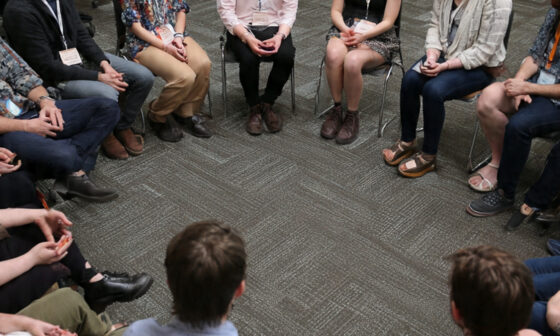One of the Big Five personality factors is openness. According to the Big Five theory, personality can be divided into five main dimensions. You can be either high or low in each trait.
The Big Five also include:
- Conscientiousness
- Extraversion
- Agreeableness
- Neuroticism
What is Openness?
Openness refers to people being open to new ideas or open to learning. This trait is not about interpersonal openness, which means being open with others. It’s more about intellectual and experiential openness to new ideas.
People who are open to experiencing the world see it from a different perspective. In Brief
- People who are open to experience tend to be intellectually curious and creative. These people have a different way of seeing the world, according to personality researchers.
- People who are less open suffer from latent inhibition. This is a brain function that blocks out cognitive and visual inputs. However, people who are open to new ideas experience less cognitive inhibition.
- More information can flow into the visual system of people who perceive more clearly than others. Researchers found that people who are open to experiencing complex emotions can share seemingly incompatible feelings simultaneously.

What does it mean to be Open-minded?
Is it possible that some people are more open-minded in their thinking and more flexible in the way they process information? Research in personality psychology has shown that people who are open-minded may perceive the world in a different way than the average person. Open-minded people are intellectually curious, creative, and imaginative. They enjoy art and love to read books, music, and other cultural products.
Although openness can be correlated with intelligence, it is only slightly. Openness can be understood as an attitude of intellectual curiosity and not necessarily as intellectual ability.
Common Characteristics Of Openness
Openness/Intellect also reflects an appreciation for esthetic experiences. In general, Openness/Intellect refers to the ability to process complex stimuli and to show interest in them.
This trait is more common in people who are highly motivated to find new experiences. They are open to new experiences that are different and unexpected. They are more inclined to pay attention to their inner feelings.
The following are characteristics of people who are open-minded:
Imagination
This term can be referred to in many ways, but the most popular is “thinking beyond the box.” The conundrum is not complete without the ability to use your imagination to solve problems and challenges.
People who are open to discovering creative ideas in themselves and bringing them to life are naturally creative. Openness is defined by the ability to use your imagination to solve problems or create new things.
People with low imagination value logic and facts over fantasy. Practical theories are more appealing than abstract ideas.
Artistic interests
Are you a fan of art in all its forms? Are you a perfectionist? Do you love finding the perfect details in everything you do? If so, you may have artistic interests. You rely on intuition as well as imagination in your daily life.
A strong interest in nature and high-art events is a sign of independence.
Emotionality
Emotionality is about finding emotional balance. Two schools of thought exist in this area. The first is the idea that our emotions are affected by how others perceive us in our youth.
Second, being able to control balance takes practice and meditation. High emotionality is a state of being aware of your thoughts and feelings. It can help you find calm in stressful situations.
Adventurousness
This is widely regarded as one of the most important traits of openness. It is easy to recognize the qualities of adventureness: taking risks, being bold, and accepting whatever outcome is your decision.
This trait is characterized by a flexible approach to life. Someone who scores high in this trait feels more excited when they do something new and outside of their normal routine. Sometimes, the riskier the activity, the more exhilarated they feel. The important thing to note is that the more adventurous someone is, the higher their score will be in openness for experience tests. This is because fear is the greatest restriction, and adventurous people lack it or don’t let it stop them.
Intellect
Intelligence can be applied in many industries, from problem-solving to abstract reality with curiosity and intrigue.
People who score high tend to be more intellectual and philosophical, especially when it comes to unique concepts.
Liberalism
This is more to do with the liberalism of choice over rules. Liberals believe dispersing power and nurturing uniqueness and diversity is the best solution.
They have high liberalism tendencies and believe they are above all rules.
- Creativity
- Mental imagery is important.
- Are you interested in learning new things?
- Loves to hear new ideas
- Enjoys abstract concepts and thinking
- More open and liberal in accepting diversity
Another psychological trait, absorption, is also associated with openness to experience; this refers to the ability to immerse yourself in fantasy or imagination. This construct could also be related to hypnotic susceptibility or the tendency to become hypnotizable.
What High Openness Looks like
Openness is strongly related to a person’s interest in art and culture. Openness is a sign of a person who enjoys the arts and seeks out complex, unusual ways to express themselves. They are more likely to be creative and love playing with ideas. They are prone to see patterns and use symbols and metaphors. They see beyond the facts to seek a deeper level of understanding.
They often have an interest in scientific theories and innovation. They enjoy abstract concepts and intellectual disciplines such as mathematics, science, language, and the visual and performing art.
They might become bored with the mundane and routine, so they prefer to find stimulating environments. They are usually politically liberal, but not always, and open to innovative and unusual ideas.
What Low Openness Looks like
People who are low in openness tend to see things literally and focus more on the practical, straightforward, and concrete. They are not interested in theories or ideas and prefer things that are practical and real.
Low in openness people tend to be more traditional and pragmatic. They are less inclined to be creative or interested in the arts and prefer to do things that make them feel useful. They are more interested in jobs and hobbies with a purpose and measurable result.
Low in Openness people don’t like to play with ideas. They also tend to have traditional values. They tend to be more realistic than imaginative and are less interested in trying new ideas if the current system is working well. They prefer to stay in their familiar environment and are creatures of habit. They might be resistant to change and will stick to what they know.
Openness and how it influences workplace behaviour
The workplace environment is affected by the willingness to share your experiences. Employers and recruiters want to know the level of their employees and the impact this has on the workplace.
It is powerful to be able to use the power of openness to learning from others in order to recruit and align business goals. How can openness impact workplace behaviour? These are just a few examples.
Imagination: The ability to think up new solutions and ideas
Do you and your team encounter seemingly impossible problems? Your team will be more open if you are willing to share your ideas.
Artistic interests: Creativity
No matter if you work in an artistic industry or something more logical, being creative can allow for more independent thinking within the workplace. This can lead to contrasting ideas that might not have been considered or seen.
Emotional Balance: How to maintain an emotional balance
Are you able to manage your emotions through adversity with a person or team? Are you prone to emotional volatility or withholding? This is something you need to know.
Adventurers: Are you willing to take risks?
Are there team members who are willing to take on risks without considering the consequences? Or risk-taking after analysis? Is the business able to manage risk at a higher level, or prefer stability?
Intellect: Intelligence and understanding
A team is made up of people who can make decisions and understand the consequences. Higher scores mean that individuals are more likely to enjoy solving abstract problems.
Liberalism: Happy to express and share their views
Are you able to have people on your team who are open to expressing their opinions? Are they going to disrupt the organization by breaking the rules? Or do you want to cause disruption in order to effect change?
These elements can have an impact on workplace behaviour. Openness can be used to measure disruption.
How is Openness Measured
Self-report inventories are used to measure openness to experiences, as well as the other four personality factors. The questionnaires usually contain several statements. People then select the response that best represents their agreement with the statement.
A typical inventory could include statements like the following. Respondents then choose between 1 (strongly disagree) and 5 (strongly agree).
How Open to Experience Are You?
This informal quiz will give you an idea of how you would rate this personality trait. Voices that might be related to openness:
- Am I good at inventing new ideas?
- Is it often the deeper meaning that I think about?
- Am I curious about how things work?
- Is it a pleasure to think about theoretical ideas?
- DO I enjoy many artistic pursuits?
- Are art and aesthetics important to me?
- Do I have an active imagination?
- Do I enjoy being around different groups of people?
- Is Philosophical discussions something I love?
- Am I prone to daydreaming or getting distracted by flights of fancy?
- Do I enjoy going to art museums and cultural events?
- Do I prefer to have a discussion than small talk?
This type of measurement has the advantage that self-reports are quick and easy to administer. However, there is a risk that respondents may choose to answer in ways they find more appealing. Sometimes, respondents choose answers that reflect their ideal self-image instead of answers that are truer to who they really are.
Read More: Cognitive Dissonance And Ways To Resolve It
Read More: Principles For Success: Develop Toughness and Build the Life You Want to Live
Read More: Why Consistency is An Important Habit
How Does Openness Influence Behaviour?
Being open is often seen as a positive trait. People who are open to learning have higher levels of intrinsic motivation and are more likely to seek knowledge for their own benefit. They are curious about the world, and they want to know more. They also enjoy trying new things so that they can adapt to changes in their lives, relationships, and environment.
Openness can have its downsides, however. People who have high levels of this trait may be more open to risky behaviour because they are looking for novelty. Interestingly, however, some studies have linked decreased openness to increased risk for drug use.
Creativity
Research consistently links creativity to only one of the five personality traits that are described by the big 5 theory: openness to new experiences. Openness to new experiences is a key factor in creativity. People with high levels of openness are more likely to be creative, take on creative tasks, engage in divergent thinking and enjoy creative hobbies.
One study showed that creativity in the arts was associated with openness. In the sciences, scientists and artists score higher than people working in other fields.
Learning and Knowledge
People with high levels of openness and curiosity are more likely to be interested in learning about new ideas. Research shows that intelligence is linked to openness to new experiences. Crystallized intelligence is the ability to apply all the knowledge and facts that one has acquired throughout their life.
Openness to new experiences has been associated with what is known as the “need for cognition” this is a need to think and engage in complex mental tasks. People with a high need to think are good at solving puzzles, brainstorming solutions for problems, and analyzing ideas.
People who have high cognition tend to pay more attention to the arguments themselves than people who have low cognition. People who are less cognitive will need to pay more attention to the likeability of the person who is presenting the argument.
Political Attitudes
Studies also show that openness can be linked to political and social attitudes. People who are more open tend to be more liberal politically. They are more open to people from diverse backgrounds, socially, culturally, and religiously. Studies also show that being open is negatively associated with right-wing authoritarianism, conservative political views, and less acceptance of others.
Openness can be linked to certain political and social attitudes. However, it’s important to recognize that such beliefs are more than just a single personality trait. Although it has been believed that personality traits are important in shaping later political attitudes, research shows that there may be an underlying genetic factor that influences the relationship.
This research shows that other traits, such as conscientiousness and order, intolerance for ambiguity, fear of danger, and the need to close the loop, also play an important role in shaping political views.
Relationships
In relationships, it can play an important role in sex. Openness is a trait that leads to more knowledge about sexual relationships and a more open attitude toward sex.
Conclusion
Openness refers to how open-minded, imaginative, and creative a person can be. People who are more open-minded tend to be more open to variety, seek out new experiences, and be curious about their surroundings.
Openness can be measured on a sliding scale, which can help businesses succeed in different situations.





